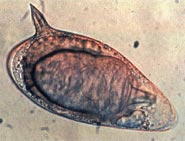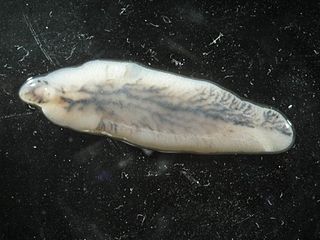
Schistosomiasis, also known as snail fever, bilharzia, and Katayama fever, is a disease caused by parasitic flatworms called schistosomes. The urinary tract or the intestines may be infected. Symptoms include abdominal pain, diarrhea, bloody stool, or blood in the urine. Those who have been infected for a long time may experience liver damage, kidney failure, infertility, or bladder cancer. In children, it may cause poor growth and learning difficulty.

Schistosoma is a genus of trematodes, commonly known as blood flukes. They are parasitic flatworms responsible for a highly significant group of infections in humans termed schistosomiasis, which is considered by the World Health Organization as the second-most socioeconomically devastating parasitic disease, with hundreds of millions infected worldwide.

Praziquantel (PZQ), sold under the brandname Biltricide among others, is a medication used to treat a number of types of parasitic worm infections in mammals, birds, amphibians, reptiles, and fish. In humans specifically, it is used to treat schistosomiasis, clonorchiasis, opisthorchiasis, tapeworm infections, cysticercosis, echinococcosis, paragonimiasis, fasciolopsiasis, and fasciolosis. It should not be used for worm infections of the eye. It is taken by mouth.
Schistosoma japonicum is an important parasite and one of the major infectious agents of schistosomiasis. This parasite has a very wide host range, infecting at least 31 species of wild mammals, including 9 carnivores, 16 rodents, one primate (human), two insectivores and three artiodactyls and therefore it can be considered a true zoonosis. Travelers should be well-aware of where this parasite might be a problem and how to prevent the infection. S. japonicum occurs in the Far East, such as China, the Philippines, Indonesia and Southeast Asia.

Schistosoma mansoni is a water-borne parasite of humans, and belongs to the group of blood flukes (Schistosoma). The adult lives in the blood vessels near the human intestine. It causes intestinal schistosomiasis. Clinical symptoms are caused by the eggs. As the leading cause of schistosomiasis in the world, it is the most prevalent parasite in humans. It is classified as a neglected tropical disease. As of 2021, the World Health Organization reports that 236.6 million people have schistosomiasis and most of it is due to S. mansoni. It is found in Africa, the Middle East, the Caribbean, Brazil, Venezuela and Suriname.

Tribendimidine is a broad-spectrum anthelmintic agent developed in China, at the National Institute of Parasitic Diseases in Shanghai. It is a derivative of amidantel.

Schistosoma haematobium is a species of digenetic trematode, belonging to a group (genus) of blood flukes (Schistosoma). It is found in Africa and the Middle East. It is the major agent of schistosomiasis, the most prevalent parasitic infection in humans. It is the only blood fluke that infects the urinary tract, causing urinary schistosomiasis, and is the leading cause of bladder cancer. The diseases are caused by the eggs.

Theodor Maximilian Bilharz was a German physician who made pioneering discoveries in the field of parasitology. His contributions led to the foundation of tropical medicine. He is best remembered as the discoverer of the blood fluke Schistosoma haematobium, the causative parasite of bloody urine (haematuria) known since ancient times in Egypt. The parasite, as the cause of bladder cancer, is declared by the International Agency for Research on Cancer as Group 1 carcinogen. The infection is known by an eponymous term bilharzia or bilharziasis, as well as by schistosomiasis.

Oxamniquine, sold under the brand name Vansil among others, is a medication used to treat schistosomiasis due to Schistosoma mansoni. Praziquantel, however, is often the preferred treatment. It is given by mouth and used as a single dose.

Neglected tropical diseases (NTDs) are a diverse group of tropical infections that are common in low-income populations in developing regions of Africa, Asia, and the Americas. They are caused by a variety of pathogens, such as viruses, bacteria, protozoa, and parasitic worms (helminths). These diseases are contrasted with the "big three" infectious diseases, which generally receive greater treatment and research funding. In sub-Saharan Africa, the effect of neglected tropical diseases as a group is comparable to that of malaria and tuberculosis. NTD co-infection can also make HIV/AIDS and tuberculosis more deadly.
Opisthorchiasis is a parasitic disease caused by certain species of genus Opisthorchis. Chronic infection may lead to cholangiocarcinoma, a cancer of the bile ducts.

Liver fluke is a collective name of a polyphyletic group of parasitic trematodes under the phylum Platyhelminthes. They are principally parasites of the liver of various mammals, including humans. Capable of moving along the blood circulation, they can occur also in bile ducts, gallbladder, and liver parenchyma. In these organs, they produce pathological lesions leading to parasitic diseases. They have complex life cycles requiring two or three different hosts, with free-living larval stages in water.

Peter Jay Hotez is an American scientist, pediatrician, and advocate in the fields of global health, vaccinology, and neglected tropical disease control. He serves as founding dean of the National School of Tropical Medicine, Professor of Pediatrics and Molecular Virology & Microbiology at Baylor College of Medicine, where he is also Director of the Texas Children's Hospital Center for Vaccine Development and Texas Children's Hospital Endowed Chair in Tropical Pediatrics, and University Professor of Biology at Baylor College of Medicine.

A Schistosomiasis vaccine is a vaccine against Schistosomiasis, a parasitic disease caused by several species of fluke of the genus Schistosoma. No effective vaccine for the disease exists yet. Schistosomiasis affects over 200 million people worldwide, mainly in rural agricultural and peri-urban areas of the third world, and approximately 10% suffer severe health complications from the infection. While chemotherapeutic drugs, such as praziquantel, oxamniquine and metrifonate both no longer on the market, are currently considered safe and effective for the treatment of schistosomiasis, reinfection occurs frequently following drug treatment, thus a vaccine is sought to provide long-term treatment. Additionally, experimental vaccination efforts have been successful in animal models of schistosomiasis.
Schistosoma mekongi is a species of trematodes, also known as flukes. It is one of the five major schistosomes that account for all human infections, the other four being S. haematobium, S. mansoni, S. japonicum, and S. intercalatum. This trematode causes schistosomiasis in humans.

Biomphalaria sudanica is a species of air-breathing freshwater snail, an aquatic pulmonate gastropod belonging to the family Planorbidae, the ram's horn snails. Biomphalaria sudanica has a discoidal, brown shell with an approximate shell diameter of 9–11mm. Biomphalaria sudanica is a medically important pest, due to it being an intermediate host of the intravascular trematode genus, Schistosoma.
The Manson Medal, named in honour of Sir Patrick Manson, is the highest accolade the Royal Society of Tropical Medicine and Hygiene awards. Started in 1923, it is awarded triennially to an individual whose contribution to tropical medicine or hygiene is deemed worthy by the council.
The London Declaration on Neglected Tropical Diseases was a collaborative disease eradication programme launched on 30 January 2012 in London. It was inspired by the World Health Organization roadmap to eradicate or prevent transmission for neglected tropical diseases by the year 2020. Officials from WHO, the World Bank, the Bill & Melinda Gates Foundation, the world's 13 leading pharmaceutical companies, and government representatives from US, UK, United Arab Emirates, Bangladesh, Brazil, Mozambique and Tanzania participated in a joint meeting at the Royal College of Physicians to launch this project. The meeting was spearheaded by Margaret Chan, Director-General of WHO, and Bill Gates, Co-Chair of the Bill & Melinda Gates Foundation.
Carcinogenic parasites are parasitic organisms that depend on other organisms for their survival, and cause cancer in such hosts. Three species of flukes (trematodes) are medically-proven carcinogenic parasites, namely the urinary blood fluke, the Southeast Asian liver fluke and the Chinese liver fluke. S. haematobium is prevalent in Africa and the Middle East, and is the leading cause of bladder cancer. O. viverrini and C. sinensis are both found in eastern and southeastern Asia, and are responsible for cholangiocarcinoma. The International Agency for Research on Cancer declared them in 2009 as a Group 1 biological carcinogens in humans.
World NTD Day or World NTD Day is an awareness day for addressing neglected tropical diseases (NTDs). It is held on January 30th annually.













